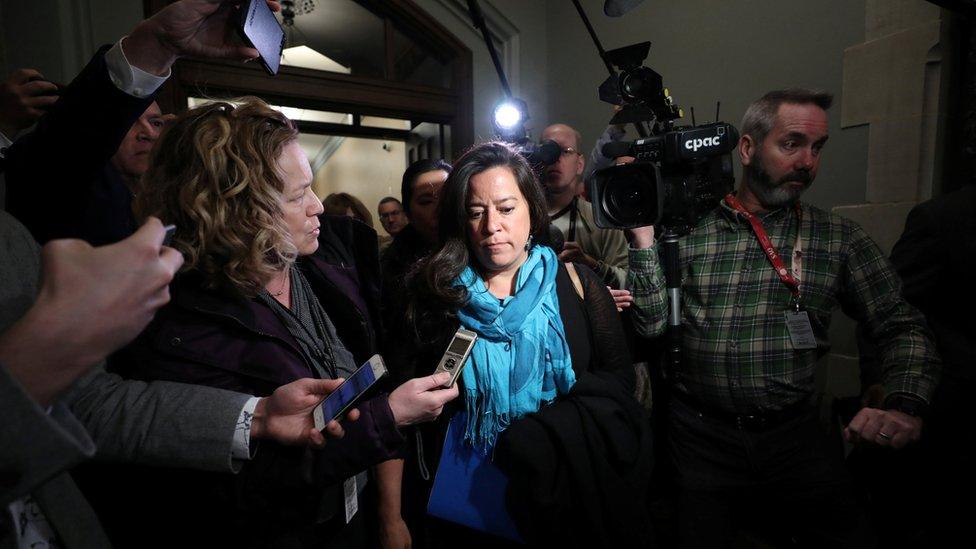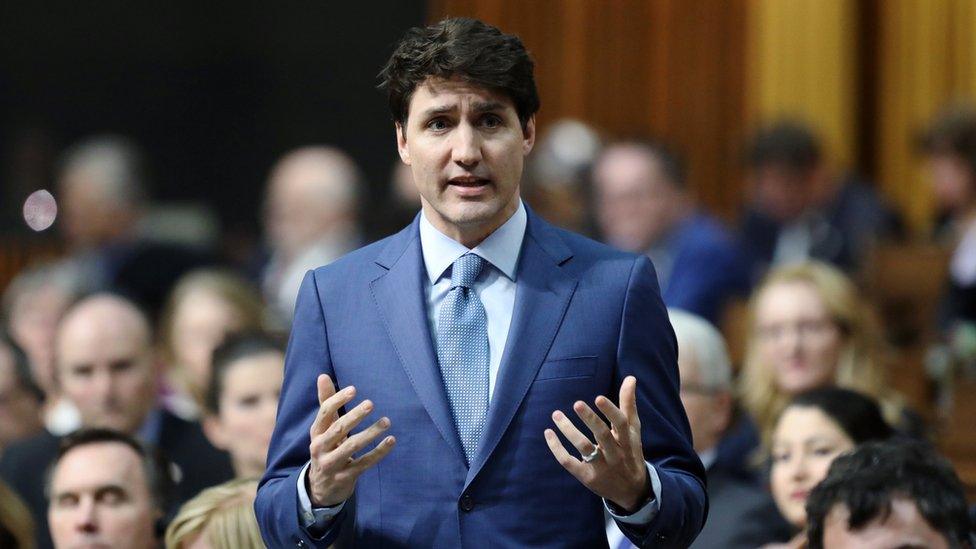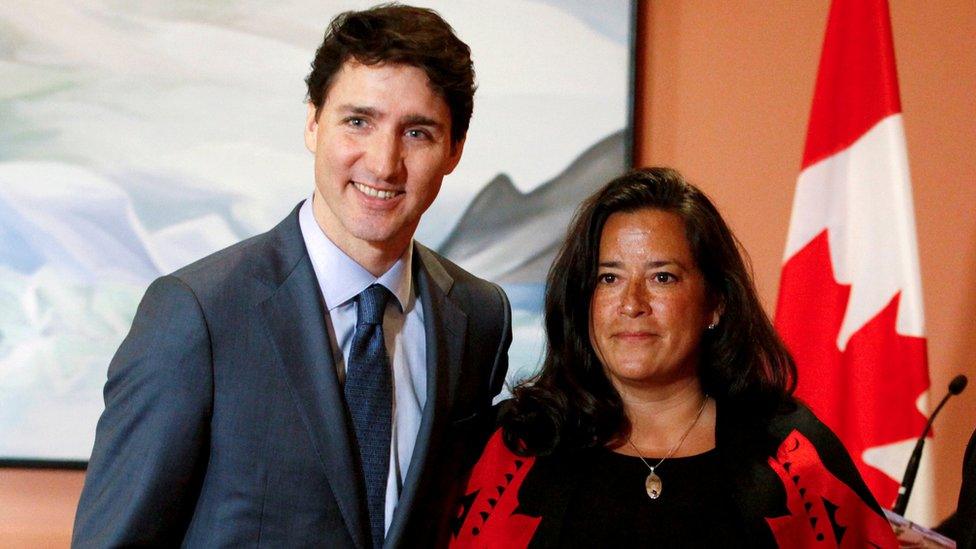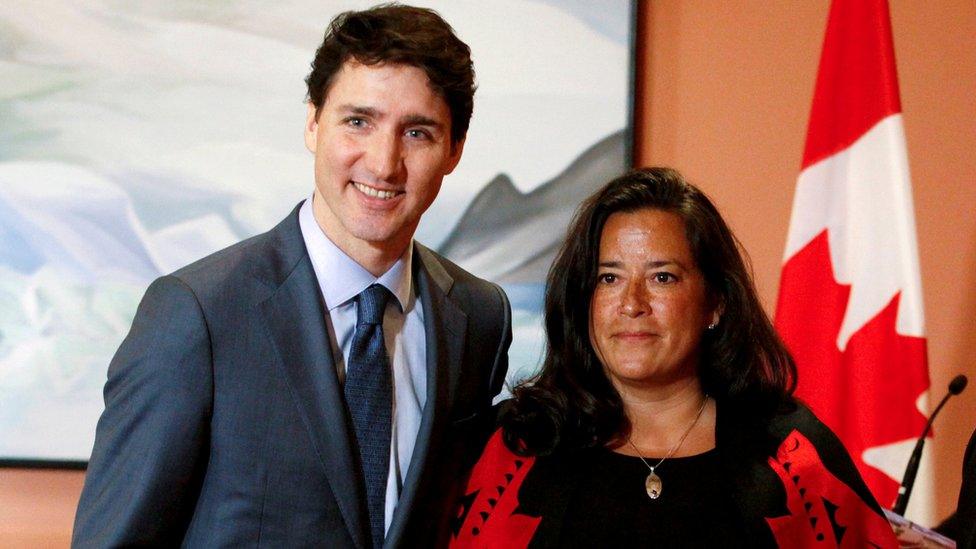Jody Wilson-Raybould: Ex-minister increases pressure on Trudeau
- Published

Jody Wilson-Raybould, former Canadian justice minister, speaks about the SNC-Lavalin affair
A former Canadian justice minister says she faced attempts at interference and "veiled threats" from top government officials seeking a legal favour for a firm facing a corruption trial.
Jody Wilson-Raybould said she was pressed repeatedly to "find a solution" for engineering giant SNC-Lavalin.
PM Justin Trudeau said he disagreed with the minister's testimony and he and his staff acted appropriately.
Opposition leader Andrew Scheer has called on him to resign.
"He can no longer, with a clear conscience, continue to lead this nation," the Conservative leader told reporters, adding that he was calling for a full police investigation.
What did the former minister say?
Speaking to the House of Commons justice committee, the former justice minister and attorney general said she and her staff faced four months of a "sustained" and "inappropriate effort" to push for a possible deferred prosecution agreement for the Quebec-based engineering and construction company.
That agreement would have allowed the firm to avoid a criminal trial and instead agree to alternative terms or conditions, like penalties or enhanced compliance measures.
It was an option rejected in September by the Public Prosecution Service of Canada - an independent authority whose main objective is to prosecute federal offences - and one she supported.
Ms Wilson-Raybould said she and her aides were pulled into multiple conversations and meetings - "a barrage of people hounding me and my staff" - with Mr Trudeau, senior aides from his office and the finance department, and a top bureaucrat.
Wilson-Raybould says she felt political pressure and "veiled threats" from government officials
In those various meetings, they repeatedly raised concerns about the possibility of job losses and potential political ramifications of a trial long after that decision had been made.
"Within these conversations, there were expressed statements regarding the necessity of interference in the SNC-Lavalin matter, the potential of consequences and veiled threats if a deferred prosecution agreement was not made available to SNC," she said.
Mr Trudeau's Liberals have struggled to contain the controversy over the past three weeks.
Though she has been a key figure at the centre of the affair, Ms Wilson-Raybould had not yet not spoken publicly, citing solicitor-client privilege.
That privilege was waived by the government on Monday, paving the way for her appearance before the committee on Wednesday.
What has happened so far?
This began in early February, when the Globe and Mail newspaper reported on allegations of political interference in the case against SNC-Lavalin.

Prime Minister Justin Trudeau has faced repeated questions about the matter from opposition parties
The newspaper reported, citing unnamed sources, that Mr Trudeau's office pressured Ms Wilson-Raybould to push the public prosecution service to consider a deferred prosecution agreement.
Ms Wilson-Raybould was attorney general and justice minister until January, when she was shuffled into the veterans affairs portfolio, a move widely seen as a demotion.
An attorney general is supposed to act independently with respect of his or her prosecutorial function.
On 12 February, Ms Wilson-Raybould resigned suddenly from Cabinet, though she remains a Liberal member of Parliament.
Finally on 18 February, Mr Trudeau's top aide Gerald Butts announced he was resigning, denying in a statement that he or anyone on his staff did anything wrong but saying he had to leave so as not to be a distraction from the "vital work" being done by the team.
Mr Trudeau and his officials have denied anything improper took place but have struggled to contain the crisis.
Speaking to reporters on Wednesday evening, he said he was worried about jobs at SNC Lavalin and how pensioners would be affected.
Opinion polls indicate the matter is beginning to hurt the Liberals with months to go until the coming general election.
What is happening with SNC Lavalin?
The Quebec-based firm is one of the world's largest engineering and construction companies.
The company and two of its subsidiaries face fraud and corruption charges in relation to approximately C$48m ($36m; £28m) in bribes it is alleged to have offered to Libyan officials between 2001 and 2011.
The firm has openly lobbied to be allowed to enter into a remediation agreement, external instead of going to trial, saying it has cleaned house and changed its ways.
The agreement - similar to regimes in the US and the UK - essentially suspends prosecution while allowing a firm to agree instead to alternative terms or conditions.
SNC-Lavalin and its supporters say it would be unfair to penalise the company as a whole and its thousands of employees for the wrongdoings of former executives.
Preliminary hearings for the charges are currently before the courts. The company says it will "vigorously defend itself" against the allegations.
A conviction could result in a decade-long ban on bidding on Canadian federal contracts, which would be a major financial hit for the firm.
- Published13 February 2019

- Published11 February 2019
